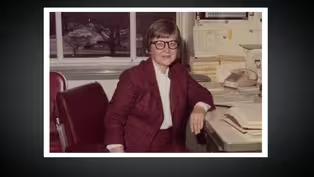
What’s behind a decline in U.S. support for LGBTQ+ rights
Clip: 3/17/2024 | 6m 41sVideo has Closed Captions
U.S. support for LGBTQ+ rights is declining after decades of support. Here’s why
For the last few decades, LGBTQ+ rights in America have seen increasing public support. But now, a new survey finds a slight decline in that support for the first time in years. William Brangham speaks with Melissa Deckman, CEO of the Public Religion Research Institute, to learn more about the data.
Problems playing video? | Closed Captioning Feedback
Problems playing video? | Closed Captioning Feedback
Major corporate funding for the PBS News Hour is provided by BDO, BNSF, Consumer Cellular, American Cruise Lines, and Raymond James. Funding for the PBS NewsHour Weekend is provided by...

What’s behind a decline in U.S. support for LGBTQ+ rights
Clip: 3/17/2024 | 6m 41sVideo has Closed Captions
For the last few decades, LGBTQ+ rights in America have seen increasing public support. But now, a new survey finds a slight decline in that support for the first time in years. William Brangham speaks with Melissa Deckman, CEO of the Public Religion Research Institute, to learn more about the data.
Problems playing video? | Closed Captioning Feedback
How to Watch PBS News Hour
PBS News Hour is available to stream on pbs.org and the free PBS App, available on iPhone, Apple TV, Android TV, Android smartphones, Amazon Fire TV, Amazon Fire Tablet, Roku, Samsung Smart TV, and Vizio.
Providing Support for PBS.org
Learn Moreabout PBS online sponsorshipJOHN YANG: For the last few decades, the story of LGBTQ plus rights in America has been one of increasing public support.
But now a new survey finds that for the first time in years, there's a slight decline in that support.
William Brangham takes a closer look.
WILLIAM BRANGHAM: Throughout 2023, the Public Religion Research Institute, or PRRI, interviewed over 22,000 adults for what it calls its American Values Atlas.
Last week, the Organization released its findings on views about LGBTQ rights in the US.
The survey showed for the first time support fell for key policies regarding LGBTQ rights, backing for same sex marriage dropped two percentage points, support for non-discrimination protections dropped four points and opposition to people refusing services based on religious grounds dropped five points.
To help us understand this data, we are joined by CEO of PRRI Melissa Deckman.
You've been doing this survey for years.
And this being the first time you've seen it a downward tick in those numbers.
What how do you explain that?
MELISSA DECKMAN, CEO, Public Religion Research Institute: Yeah, we were somewhat surprised to see after several years of increasing support among Americans for LGBTQ rights, that we saw a decline.
But I think if you look under the hood, so to speak, and look at the data more closely, it's really largely driven by party polarization.
And so we saw much deeper declines, for example, among Republicans in terms of their support for these issues, whereas Democrats tended to stay relatively stable.
And I think what's happening is that you see many Republican leaders in red states, really trying to amp up the volume, so to speak on LGBTQ rights, and really trying to claw back some of those rights across the country.
And I think that's had a spillover effect nationally in terms of the attitudes of Republicans, especially on issues with respect to LGBT rights.
WILLIAM BRANGHAM: In your survey, you're talking to people who both affiliate with a particular religion and also non-religious people as well, correct?
MELISSA DECKMAN: That's right.
So our surveys are done among Americans nationally.
One great thing about the ABA is we also have enough data to look at opinions in all 50 states.
But essentially, we get a snapshot of all Americans, including people of faith and people who are unaffiliated.
I think it's also important to bear in mind that despite these declines that we've seen, the vast majority of people of faith continue to support the rights of LGBTQ Americans, especially with respect to same sex marriage and non-discrimination laws.
WILLIAM BRANGHAM: So for someone who might look at this and think, Oh, what a 2 percent decline or a 5 percent decline is not that substantial.
What Why does this really stand out to you?
MELISSA DECKMAN: I think it stands out.
Because with respect to LGBT rights, we're generally there has been a growing increase in support among Americans.
And part of that is a reflection of the fact that more Americans, especially younger Americans, are identifying as LGBTQ.
So younger Americans, more Americans have friends who are LGBTQ, they themselves are LGBTQ, they have colleagues.
So there has been this assumption that as we become more, I think, accepting of LGBT Americans in our daily lives, that it would just naturally lend itself to people being more supportive of protecting the rights of LGBTQ Americans.
But I think this data shows you that that's not necessarily an assumption that is true.
And so it's something important to monitor and keep aware of.
WILLIAM BRANGHAM: I mean, is it perhaps also possible that as people start to identify more publicly and assert their rights and take a more prominent place in society, that we could be seeing the traces of a backlash year?
MELISSA DECKMAN: I think that's exactly what you're seeing.
One of the things that we analyze in the report is we look at the relationship between Christian nationalist views and support for LGBTQ rights.
As you might imagine, Americans who have a tendency to support Christian nationalism are far less likely to support the rights of LGBTQ Americans, in part because of the theological opposition to the idea of really homosexuality and being queer to begin with.
And so I think that there's that important relationship there that we have to really keep in mind.
WILLIAM BRANGHAM: You're talking about are there other below the top lines here other data points that really that were of interest to you?
MELISSA DECKMAN: We were really surprised in our findings that younger Americans have trended downward with respect to support for LGBTQ rights.
If you look at our data, we find that roughly one in five Americans aged 18 to 29 identify as LGBTQ.
But yet what's happened over the past couple of years is that there's been a slight decline among younger Americans.
I think the assumption was that because younger Americans are more likely to identify as queer that we'd always have younger Americans being more supportive.
Again, though, you have to look under the hood.
It's really party polarization that is driving down support among younger Americans for same sex marriage, for example.
So one number really stands out to us.
If you look at young Americans attitudes about same sex marriage, and 2020 among Republicans, two thirds supported same sex marriage rights.
But in last year's data among young Republicans aged 18 to 29, it's less than half, that's a really big cratering of support.
I think there was often an assumption among many political analysts that younger Republicans would moderate the party with respect to things like LGBTQ rights, or even abortion rights or climate change, et cetera.
But what we're finding in this data is that younger Republicans are very conservative socially.
WILLIAM BRANGHAM: So interesting.
For people who are LGBTQ or work to help solidify their rights, what does this survey data tell you about what work lies ahead for them?
MELISSA DECKMAN: Well, I think there's the survey data, it really points, as we like to say, the canary in the coal mine idea that you can assume that such rights are going to be held in perpetuity or will increase.
And you can also assume just because the vast majority of Americans support these rights, that those rights are going to be legally protected, especially in wake of the Dobbs decision.
There's now a conservative majority on the Supreme Court.
And there's indication that the rights of same sex marriage are going to be on the line you're going to have legal challenges from conservative groups are going to be fighting to rollback those rights.
And I think that this is just a good reminder that those rights shouldn't be taken for granted that it's going to take political organizing, and that elections have consequences.
WILLIAM BRANGHAM: All right, that is the CEO of PRRI, Melissa Deckman.
Thank you so much for being here.
MELISSA DECKMAN: Thank you.
How Catholic-run hospitals restrict reproductive health care
Video has Closed Captions
Clip: 3/17/2024 | 7m 13s | Investigation finds policies at Catholic-run hospitals restrict reproductive health care (7m 13s)
The life and achievements of chemist Stephanie Kwolek
Video has Closed Captions
Clip: 3/17/2024 | 5m 46s | The life and achievements of chemist Stephanie Kwolek, inventor of Kevlar (5m 46s)
Providing Support for PBS.org
Learn Moreabout PBS online sponsorship
- News and Public Affairs

FRONTLINE is investigative journalism that questions, explains and changes our world.

- News and Public Affairs

Amanpour and Company features conversations with leaders and decision makers.












Support for PBS provided by:
Major corporate funding for the PBS News Hour is provided by BDO, BNSF, Consumer Cellular, American Cruise Lines, and Raymond James. Funding for the PBS NewsHour Weekend is provided by...

